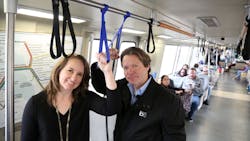Systems drop fare collection to further enhance COVID-19 mitigation measures
Some transit systems are taking the extra step of protecting operators against the spread of novel coronavirus by temporarily waiving fares on their systems and instituting rear door boarding where possible.
Over the weekend, Sound Transit and King County Metro said they would suspend fare enforcement temporarily as an added safety precaution.
Akron Metro Regional Transit Authority began offering fare free transit to riders on March 17 on all its services.
“These are challenging times for everyone. By offering free fares, we hope to alleviate the financial burden so many folks are unexpectedly faced with in the communities we proudly serve. We also hope this assists with the distancing challenges our bus operators face when interacting with passengers during their trips,” said Akron Metro Executive Director Dawn Distler.
Toledo Area Regional Transit Authority (TARTA) is waiving fares for all fixed-line, TARPS and Call-A-Ride services until further notice.
SunLine Transit Agency in Thousand Palms, Calif., is operating its local fixed route bus service free-of-charge as of March 17.
“We’re so incredibly proud of the dedicated team at SunLine and the efforts made to quickly mobilize this response to recommendations by health officials. It reflects how we all truly care for our riders, each other and the community we serve,” said CEO/General Manager Lauren Skiver. “We understand this pandemic is affecting our riders on a multitude of levels, and believe helping out our customers impacted by this health emergency is the right thing to do.”
The city of Las Cruces, N.M., RoadRUNNER Transit and Dial-a-Ride services temporarily halted the collection of fares as of March 16 to reduce cash and fare handling and minimize face-to-face interactions with other passengers and transit staff.
The Des Moines Area Regional Transit Authority has suspended fare collection as of March 17 and is asking riders who can safely do so to get on and off the bus through the back door. Riders with accessibility devices will still be able to board through the front doors.
TransIT Services of Frederick County in Frederick, Md., will be offering fare free rides through Saturday, March 28, on its routes and is advising riders who use its app to not activate tickets.
QLINE in Detroit, Mich., will indefinitely suspend fares, which the service provider explains will limit contact points including the cash machine onboard the streetcar and the credit card machines at the station.
The Greater Peoria Mass Transit District (GPMTD) is suspending fare collection on all transportation services through April 1, but GPMTD explains this is an anticipated date.
Connect Transit in Normal, Ill., will suspend fares on all transportation services including Connect Transit fixed-route bus service and Connect Mobility paratransit service between March 18 and April 1, which, like GPMTD, is an anticipated date.
The Rockford Mass Transit District (RMTD) will waive fares starting March 18 through April 1. The district says this is an effort to reduce surface contact with the fareboxes and increase more social distancing when boarding and alighting. This initiative also reduces cash and fare media interactions at our customer service windows at RMTD Transfer Centers.
Sangamon Menard Area Regional Transit (SMART) and Sangamon Mass Transit District (SMTD) have suspended fares for rural, fixed route and paratransit services throughout the Springfield, Ill., service area.
“We recommend the public remain at home at this time, of course,” said Frank Squires, SMTD managing director, “but for those that must use public transportation, we’re doing what we can to decrease the amount of contact between people to protect our operators and our passengers.”
Rear door boarding and other measures
OC Transpo is asking riders to enter and exit buses using the back doors only. Riders with accessibility and Cooperative Seating requirements will still be allowed to board at the front. OC Transpo also ceased the acceptance of cash fares or paper transfers.
The Société de transport de Laval (STL) will require that some passengers board buses from the rear door and has applied social distancing restrictions to its shared taxi service, which limits a single passenger per taxi.
About the Author

Mischa Wanek-Libman
Group Editorial Director
Mischa Wanek-Libman is director of communications with Transdev North America. She has more than 20 years of experience working in the transportation industry covering construction projects, engineering challenges, transit and rail operations and best practices.
Wanek-Libman has held top editorial positions at freight rail and public transportation business-to-business publications including as editor-in-chief and editorial director of Mass Transit from 2018-2024. She has been recognized for editorial excellence through her individual work, as well as for collaborative content.
She is an active member of the American Public Transportation Association's Marketing and Communications Committee and served 14 years as a Board Observer on the National Railroad Construction and Maintenance Association (NRC) Board of Directors.
She is a graduate of Drake University in Des Moines, Iowa, where she earned a Bachelor of Arts degree in Journalism and Mass Communication.

